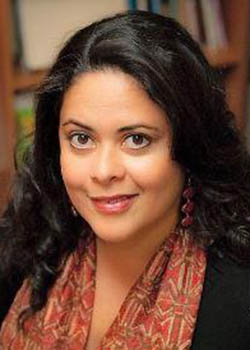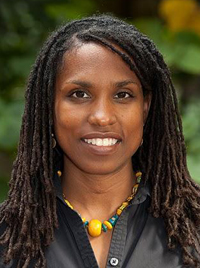

This Community Voice commentary column co-written by University of Hawaiʻi at Mānoa faculty members Maya Soetoro-Ng, director of the Spark M. Matsunaga Institute for Peace, and Maxine Burkett, associate professor at the William S. Richardson School of Law, ran on the Honolulu Civil Beat website on March 14, 2019.
It’s past time to change the rules, according to young voices today. If the rules mean that we do not act swiftly to arrest climate change, it’s hard for these two moms and educators to argue otherwise.
Young activists, like 16-year-old Greta Thunberg, have a clarity of vision and level of conviction that is inspiring a movement—a movement that promises to teach more about leadership in this time of climate crisis than is being offered in our classrooms.
This Friday is a perfect example. Students around the world are striking in solidarity to demand meaningful action in response to the climate crisis. Hundreds of thousands of young leaders in middle school and high school will skip classes as part of the “March 15 School Strike 4 Climate.”
Young people, supported by university students and adults, will protest political inaction and indecisiveness in the face of a warming planet, the many dangers it is bringing, and the “new abnormal” that experts forecast.
Last year, we started the Institute for Climate and Peace (ICP) because of our grave concern about climate change, and because we understand the power of connection, community, and the ingenuity, creativity and passion of young people today. Organized action like the School Strike 4 Climate is precisely the sort of peaceful effort that can help to change the political landscape and establish new foundations for better, climate-resilient futures.
The extraordinarily complex challenges climate change presents require innovative strategies and solutions. Peace-building principles and methods will play a critical role in sustainable solutions, reducing friction and trauma, establishing shared understanding, and cultivating new pathways for progress.
These are new lessons for all of us to learn, and that education may well start in the streets. Peaceful, organized demonstration—especially when led by committed youth—can lead to major social and political progress, and it is undeniable that their future hinges on meaningful progress.
A powerful lesson
For students in particular, there is an especially powerful lesson to be learned through participation in a public and too-often politicized debate from which they are routinely excluded. These young activists will develop resilience and learn the power of building a community voice. They understand that they are poised to be leaders in today’s world, and that they must not wait for a future that they simply inherit; instead, they must build a preferred future. That becomes possible only if we support them and provide them with the needed space, resources and respect.
At ICP, we believe deeply in the power and potential of youth. Our efforts in communities throughout the Pacific-Asia region are designed to provide opportunities for students and young leaders to help build a zero carbon future, engage in the hard but critical work of positive peace-building, and ensure climate-resilient communities for all, particularly the most vulnerable among us. In the youth workshops we have led in Hawaii and abroad, we have seen the unabashed optimism and action-focused commitment of younger generations that will be instrumental in addressing and mitigating coming change.
To truly address climate change and build peace, we must all recognize that playing by the rules is a dangerous strategy. The students striking for action understand that the rules as they are currently designed are propelling us toward climate chaos.
Rather than accepting the inevitable, they are channeling their efforts to transform policies and design more peaceful futures by taking decisive action in a public forum. They are modeling the kind of learning and leadership that will be indispensable in the years and decades to come.
On Friday, we hope the rest of the world will join us in directing our attention, energies, and support to the thousands of students who, on strike from school, are demanding a more consequential and beneficial education.
Editor’s note: Maxine Burkett is co-founder and executive director of the Institute for Climate and Peace. Maya Soetoro-Ng is co-founder and advisor of the ICP.

